The Twelve Kingdoms — Epic Win
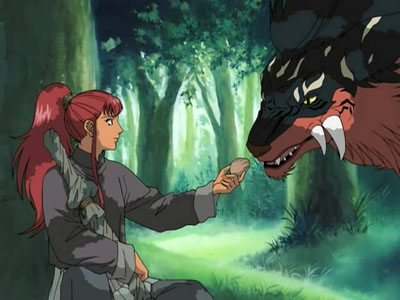
Do not feed the demon hounds
Why do I spend most of my time revisiting old titles these days? I have no idea. Maybe it’s just pure nostalgia, or maybe it’s just too much work for a lazy bum like me to get into something new. The Twelve Kingdoms is a series of novels by Fuyumi Ono first published in 1991 and subsequently adapted into an anime in 2002. All things considered, it’s almost as old as me. I think it’s probably one of the greatest stories ever told through anime. If only more people watched it.
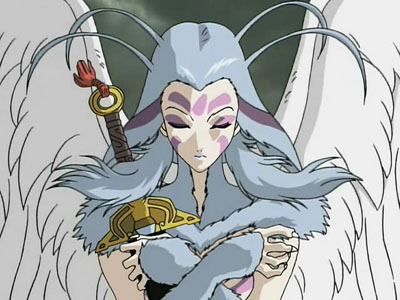
I became a teenager with the turn of the millennium (sort of), hence the start of the 21st century sort of exemplifies the idea of contemporary in my subconscious mind. The year 2000 seems like only yesterday. I suppose this may simply be another manifestation of nostalgia, but I just find it interesting that my perception of date is always relative to the year 2000 (i.e. 1998 is a long time ago but 2001 is just recently). The Twelve Kingdoms therefore belongs to this peculiar part of my recollection, frozen in time in the “recent” category.
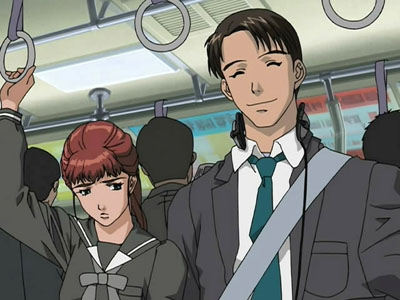
But I digress. The Twelve Kingdoms is a fantasy epic set in a world divided into twelve kingdoms (duh). The story is heavily influenced by Chinese and Japanese folklores and centres around Youko Nakajima, a Japanese high school student. The opening premise sounds very much like the typical girl-falls-into-well cliché, but fortunately Twelve Kingdoms is not just another action adventure cum romantic comedy. Rather, it is one of those epic stories about the trials and tribulations of the human condition that, if it had been told in an earlier era, could have been the foundation of entire oral traditions and civilizations.
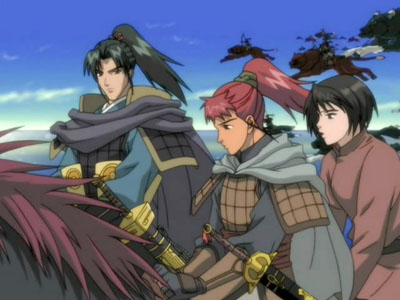
A really good fantasy story, in my opinion, presents the same features as a really good science fiction. It is easy to substitute robots for tanks and call the resulting abomination “sci-fi”, or to throw in some elves and magic and call it “fantasy”, but doing so defeats the point of the genre. A good fantasy story requires an out-of-this-world setting that is fantastically exotic and yet logical and believable in its internal workings. I enjoy Warcraft lore and all, but all too often the solution to every problem in the novels tends to be “obtain more powerful magic from x”. I just can’t stand that in storytelling. I suppose this is a problem inherent in the sub-genre of fantasy novels that bears the legacy of Dungeons & Dragons…
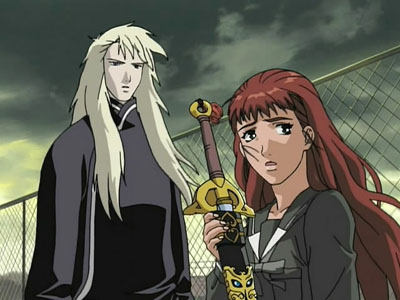
Oh shit I digress again. Anyway, The Twelve Kingdoms is an excellent example of a story that fully exploits the intricacies of its unique settings. Each of the twelve kingdoms in the story (represented by a single Chinese character in the style of Romance of the Three Kingdoms) is ruled by a monarch chosen by divine will (that of Tentei 天帝, which is really the Chinese word for “Heavens”), similar to the ancient Chinese belief of Mandate of Heaven. Unlike ancient China however, this mandate is not hereditary, and therein lies the crux of the story.
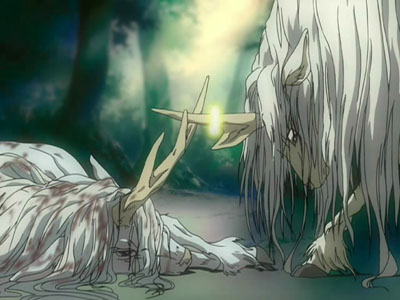
At the centre of the world, a divine being known as the Kirin is born for each of the kingdoms. A Kirin (something like a chimera in Chinese folklore but depicted in the show as a unicorn-like creature) selects the ruler of the kingdom it represents, and both the Kirin and the chosen monarch possess eternal life but remain vulnerable to mortal wounds. The presence of a monarch in a kingdom is enough to help mitigate natural disasters and Youma (demon) attacks within its borders. However, if a monarch rules tyrannically or incompetently and incurs the wrath of Tentei, the Kirin suffers from a divine ailment and eventually dies with the monarch soon to follow.
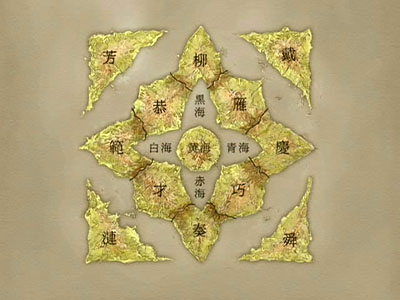
The Twelve Kingdoms
This presents many interesting what-if scenarios which the writer explores in great details. What if a Kirin is compelled by divine forces to choose a king whom he knows is incapable of just rule? With Kirins as the physical proof of the divine providence behind the throne, do the people have the right to revolt against an unjust king or must they suffer in silence as they wait for heavenly judgement? Each scenario is explored through a very engaging story that distills these macro concepts into the personal life stories of the various major characters, and each mini story helps to paint a picture of a living, breathing world.
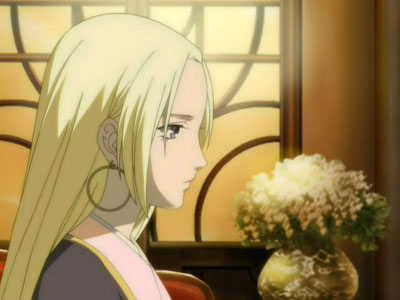
A female Kirin in human form
Themes of racial discrimination, xenophobia, corruption, poltical infighting, it’s all there. I do wonder how a liberal Western mind perceive the depiction of duty and honour (absolute loyalty to the throne and what not) in the story, one that is rather Confucian and somewhat undemocratic (power sharing be damned). It’s interesting because these somewhat feudalistic values can still be observed in Asian politics and business. But of course unlike in real life, divine retribution is a cause for real concern for any aspiring tyrant in The Twelve Kingdoms.
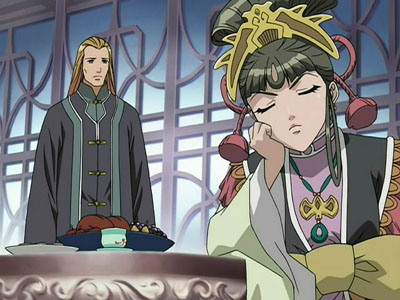
With the rare exception, Kirins are generally blond
Due to the fact that Fuyumi Ono had not finished writing the novels at the end of the first season (up to episode 39), the second season was prematurely aborted at episode 45 with a hanging conclusion. The novels are now completed with a total of 7 books divided into 11 volumes (Japanese novels are tiny; the Da Vinci Code takes up two volumes) so you can give them a try if you read Japanese. The TV series more or less covered the events of the first four novels with some changes.
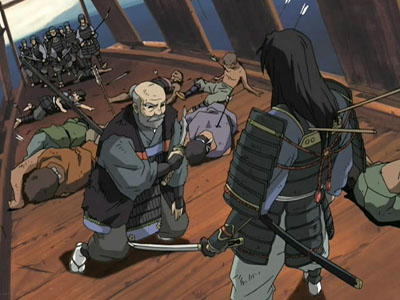
For those who don’t, the good news is that since March 2007, Tokyopop has been releasing translations of the novels. The bad news is that it’s doing this at the rate of exactly one book per year, so assuming all goes well (an optimistic assumption in the manga licensing industry), it will take another four more years for the complete translation. The three books currently released do not go beyond the scope of the TV series, although “The Vast Spread of the Seas” (東の海神 西の滄海) was sort of rushed through in episodes 40-45.
Personally I don’t see why Tokyopop had to mutilate the book names and cut them down to half, but I do like their artsy cover designs.
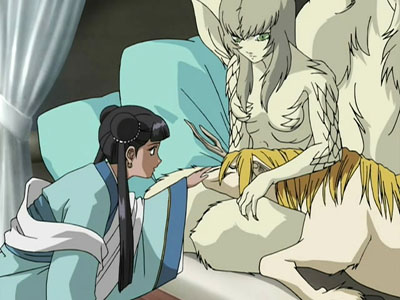
Anyway, give The Twelve Kingdoms a try if you haven’t already. I know many people who give up after a few episodes because they feel that the plot is too slow or generic, but it’s all worth the effort.
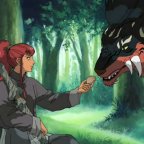



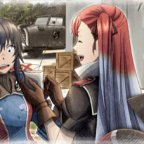


June 9th, 2009 at 6:15 pm
I agree, I enjoyed the Twelve Kingdoms, though I have yet to (and probably won’t in a long time) get my hands on the reading material, considering I can’t read Japanese. I did watch the anime, and probably the funniest thing was when Youko participated in that “rebellion” undercover.
Then the guy died and it was all sad :(. Damn.
June 9th, 2009 at 7:07 pm
The Tokyopop books are good reads; they’re translated pretty well.
…and I’ve forgotten what I should’ve repeated in regards to the first 6 episodes. I know it took me two tries to finish the first story arc. So don’t force yourself.
June 9th, 2009 at 7:55 pm
I can’t say anything about the anime, as I haven’t seen it, but I agree about the novels are great – if you are determined, finding translations on the net (pre-tokyopop ones) isn’t that hard and certainly worthwhile.
And yes, participating in rebellion in your own country was “interesting”. And then shaming the general of incoming forces :D
June 9th, 2009 at 8:34 pm
It’s a huge shame that the author is too bloody lazy to get around to writing more of the novels. I suspect that 12 Kingdoms is going to be one of those excellent-but-never-finished series forever. :(
I also found that I really enjoyed Saiunkoku Monogatari for a lot of the same reasons that I liked 12K, though the tone is lighter and its strengths lie more in the characters than the overall writing. Still, if you’re ever feeling bored (and haven’t already watched it!) it might be worth a look.
June 10th, 2009 at 2:55 am
Did somebody call for Epic Win? ^^
LOL, actually when I first saw the post title pop up in my feedreader I had a moment of confusion where I was thinking, “I don’t remember writing up a post about the Twelve Kingdoms…”
Well put. I think that’s one reason I enjoyed Robert Jordan’s Wheel of Time series so much – while it didn’t always make sense, there was at least a certain pseudo-scientific logic behind how the magic functioned.
And that right there summarizes nicely what I like most about this series. =D
June 10th, 2009 at 3:57 am
This’ll probably just be another one I never end up finishing. Such an epic show, it needs a conclusion!
Trackback from
Silver Diamond, 12 Kingdoms, and SwipingJune 11th, 2009 at 10:58 am
[...] Diamond 1-4 – Review of one of my favorite current Tokyopop series. The Twelve Kingdoms – Epic Win – Overview of the classic anime series Taking a swipe at what passes for comic journalism [...]
June 11th, 2009 at 11:26 am
….i’ve only watched something 50+ episodes a couple times…seems kinda LONg lol
June 12th, 2009 at 8:56 pm
Hi, just a quick note:
“The novels are now completed with a total of 7 books divided into 11 volumes…”
Actually, Ono left us hanging at the end of her last full length novel (黄昏の岸 暁の天), and fans have been waiting since 2001 for what happens next! The last book published after that was a short story collection that fills in a lot of back story but wasn’t a continuation of what happened.
She did more recently (early 2008) write another short story in the 12 Kingdoms world that was published in a magazine, so there’s hope that she’ll get a move on.
Have always enjoyed your reviews! Especially Code Geass R2, for which a lot of times I looked forward more to reading your review of an episode than watching the episode itself. XD;;
June 16th, 2009 at 4:15 am
Ooooh, I loved this show. I almost went into rage when it abruptly ended at 45. Makes you wonder if the studio [Pierrot or DEEN, i forgot] would pick it up again now that the novels are complete.
June 17th, 2009 at 4:46 pm
Why dont you try watching maison ikkoku since you are into old animes these days. It has a lot of episodes though. 96 eps + a movie and a OVA i think.
June 19th, 2009 at 1:25 am
I’ve been told to watch this show forever and I just might have to do that sometime soon since I’ve been missing some good fantasy epics to watch as of late. It also doesn’t hurt that the soundtrack is pretty darn solid on top of all that.
June 19th, 2009 at 10:11 am
I absolutely adore 12 kingdoms… i think I spazzed at the end. Not only was the animation sooo much better by the end, but the story was getting amazingly interesting. I was really starting to want to watch the rest of it… but apparently not. Cuz it’s non-existant. I’m willing to wait until Tokyopop’s done translating them all before buying and reading them all in one go. I’m now incredibly excited :D
Reading this reminded me why I absolutely love it. Soooo much was taught to me via this anime… it’s educational, without actually being educational. The characters are great, and … I really love it. Really, they need to finish this… both in book and in anime format… So much was about to happen in the anime… and they all just… stopped. :(
July 5th, 2009 at 10:38 am
Finished the show on your recommendation. It’s good shit. Any other “old” series to recommend?
September 17th, 2009 at 5:27 am
The Tokyopop translations are rather juvenile with regards to how it actually reads in English.
I noticed too many redundancies in the words; part of a translation is a translation of literary conventions between languages. Referring to ‘the dog’ so many times as opposed to changing it up with ‘it,’ or ‘he,’ or ‘she’ kind of grates on stylistic nerves.
Still, it’s an awesome story and the anime is great, too.
September 30th, 2009 at 2:15 pm
I agree, I enjoyed the Twelve Kingdoms, though I have yet to (and probably won’t in a long time) get my hands on the reading material, considering I can’t read Japanese.
i like the story very nice
the last episode aim sad
January 10th, 2011 at 10:38 pm
I WANT THE BOOK!!! PLEASE CAN ANYONE TELL ME HOW ICAN GET HOLD OF IT IN THE UK, IN ENGLAND!!!!